Thousands of people across the country will gather on Nov. 11 to pay respects to soldiers who gave their lives to serve our country.
But another upcoming date focuses on a group of soldiers who fought alongside fellow Canadians but did so under different circumstances. Nov. 8 is Indigenous Veterans Day in Canada, a chance to honour the thousands of Indigenous, Métis and Inuit soldiers who were not drafted to fight but still voluntarily served during the world wars.
Sḵwx̱wú7mesh Úxwumixw (Squamish Nation) councillor Sxwíxwtn (Wilson Williams) is helping enhance the Indigenous Legacy Project for another year by offering support and recommendations to Veteran Affairs Canada.
“There’s a lot of history that hasn’t come out in relation and respect to our Indigenous soldiers that went to war,” Williams said.
The Indigenous Legacy Project began in 2023, an initiative to help identify and mark the graves of Indigenous soldiers buried in cemeteries across the Netherlands in the Second World War.
Williams met with Veteran Affairs Canada in Ottawa in September and suggested that the country needs a “big picture focus” on educating youth on the history of who went to war, emphasizing the importance of remembering the past.
Indigenous soldiers faced different circumstances, Williams said. Soldiers volunteered to serve instead of being drafted as they weren’t considered citizens.
More than 4,000 served in uniform in the First World War, and more than 3,000 First Nation members served in the Second World War.
For those who returned home, they didn’t receive the same benefits as non-Indigenous soldiers, Williams said, making it more difficult coming back into society.
“Imagine that pride to volunteer and say, ‘I want to fight for our country, even though I’m not considered a citizen and don’t have the same rights to be treated the same as everybody else in Canada,’” Williams said.
But we’ve come a long way in recognizing that history through initiatives like the Indigenous Legacy Project, he said.
To add to the project, Williams is taking part in the opening and closing ceremony of the Invictus Games in Whistler in February 2025.
The Invictus Games is a global multi-sport event that celebrates the spirit of wounded, injured and sick uniform personnel and veterans.
Williams will represent the four host nations – the Squamish, Lil’wat, Musqueam and Tsleil-Waututh Nations. In the opening ceremony, Williams will be accepting a torch to represent the host Nations when the games are in Whistler.
“I’m so honoured to be a part of the Invictus Games Vancouver-Whistler,” Williams said. “The Games themselves are part of having courage, bravery and showing that they aren’t conquered."
“It’s not about winning a medal; it’s about coming together and supporting one another,” he added.
Being part of the Indigenous Legacy Project has brought Williams closer to his own connections to the world wars.
William said last year when he went to the Netherlands, he learned the story of his great uncle, Thomas Williams, who served in the Second World War.
“These stories, it’s our duty to carry them and make sure they stay alive,” Williams said.
November marks a special month of remembering, both the soldiers who returned and those who didn’t, Williams said, but also recognizing that Canada is relatively free from major conflict when compared to other countries.
But remembering these stories and histories should be highlighted year-round, Williams said.
“It’s beyond the Indigenous Remembrance Day, or the national Remembrance Day,” Williams said. “It’s more about educating and bringing out this history and taking the opportunity to learn about it.”
“Keeping these stories alive is going to be a major part of keeping that history at the forefront,” he said.
Abby Luciano is the Indigenous and civic affairs reporter for the North Shore News. This reporting beat is made possible by the Local Journalism Initiative. [email protected]




